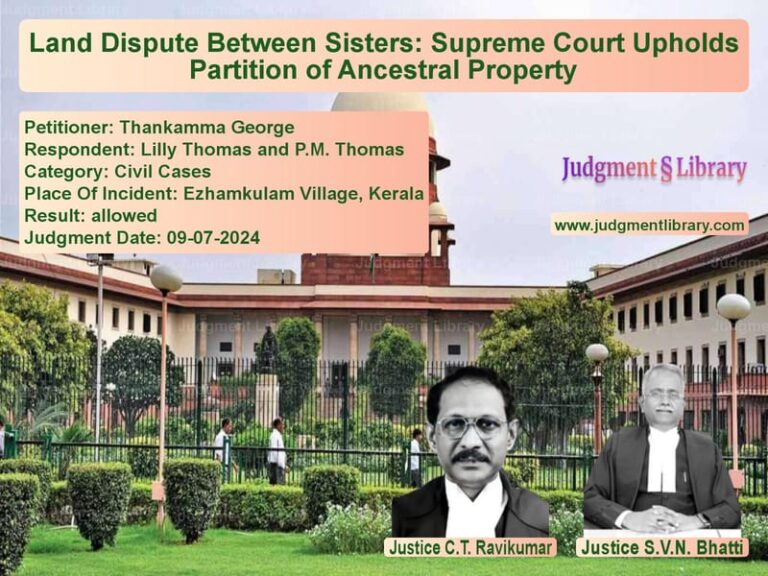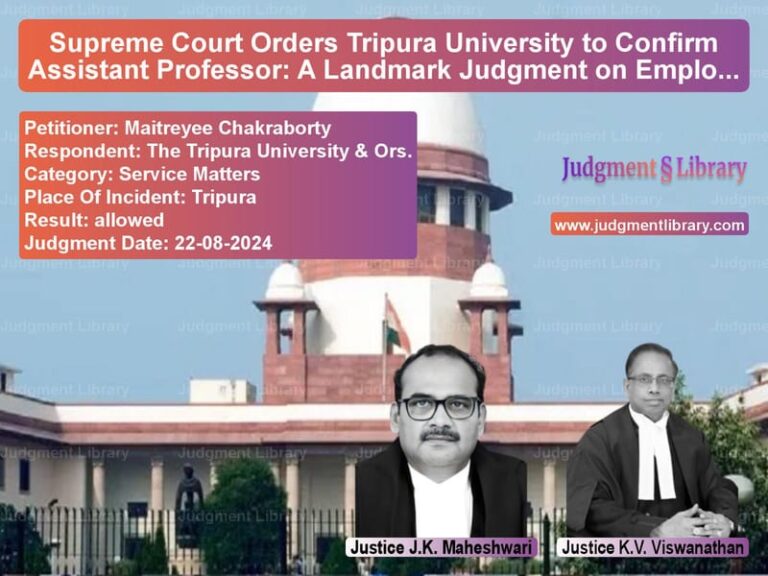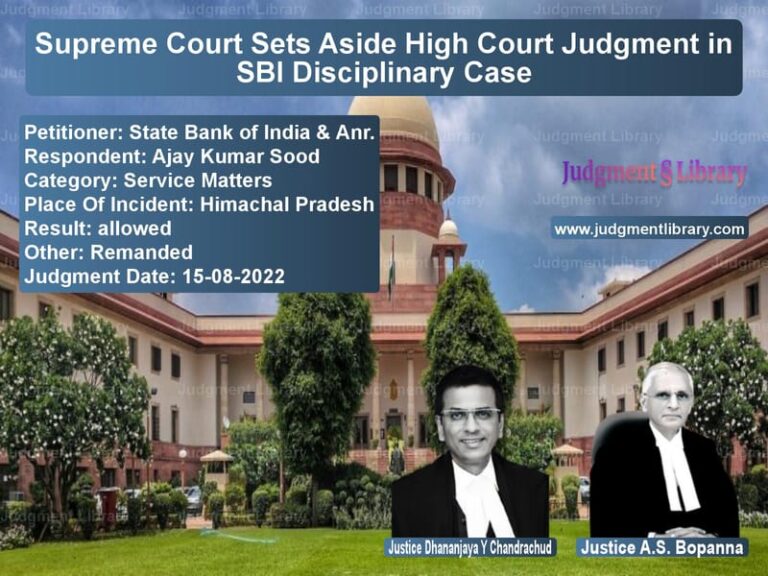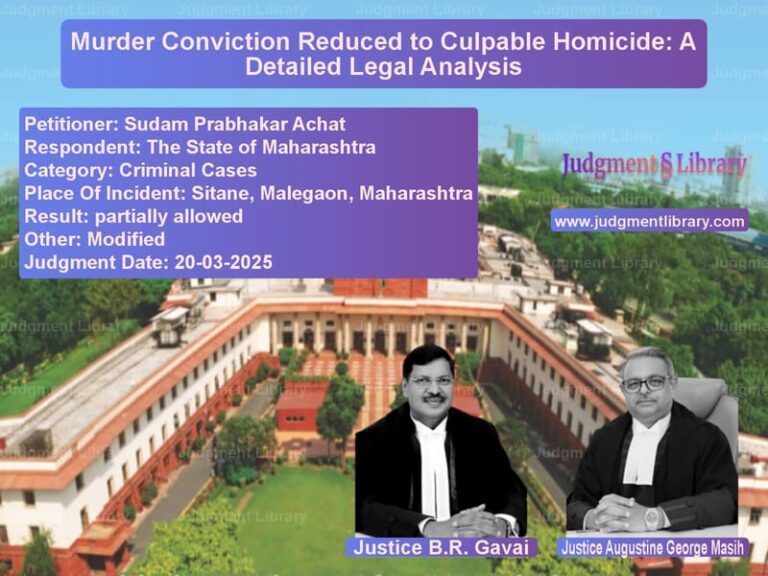Supreme Court Ruling on Organised Group ‘A’ Status for CAPFs and RPF
The Supreme Court of India recently issued a significant ruling in the case of Union of India & Others v. Sri Harananda & Others, concerning the issue of granting Organised Group ‘A’ status to the Railway Protection Force (RPF) and the Central Armed Police Forces (CAPFs). The judgment provided clarity on the implications of this designation, specifically with respect to the rights of Indian Police Service (IPS) officers for deputation to CAPFs, and the grant of certain benefits under the Ministry of Home Affairs. The matter was initially raised due to the controversy over the rights of IPS officers, and whether granting Group ‘A’ status to RPF and CAPFs would infringe upon those rights.
Background of the Case
The dispute began with the Indian Government’s decision to grant Organised Group ‘A’ Central Services status to the Railway Protection Force (RPF) and the Central Armed Police Forces (CAPFs), which included forces like the Border Security Force (BSF), Central Reserve Police Force (CRPF), and others. This status would elevate the standing of RPF and CAPFs, and the officers within these forces would be entitled to the same rights and benefits as other Group ‘A’ officers in the central government.
The controversy arose when IPS officers, represented by the Indian Police Service Central Association, argued that their rights for deputation to CAPFs were being undermined by the decision to grant Group ‘A’ status to these forces. They claimed that their opportunity for promotion and deputation to senior positions within the CAPFs would be restricted if the forces were given such a designation. Furthermore, there were concerns about whether the policy conflicted with the existing provisions and recruitment rules for IPS officers.
The Ministry of Home Affairs, which oversees both RPF and CAPFs, argued that the decision to grant Organised Group ‘A’ status to these forces was in the interest of enhancing their operational capabilities and providing them parity with other central forces. They maintained that the grant did not impact the legitimate rights of IPS officers for deputation, which would continue as per existing rules.
Arguments by the Petitioners (Union of India and Others)
- The Union of India, represented by the Ministry of Home Affairs, argued that the decision to grant Group ‘A’ status to the RPF and CAPFs was a necessary step to bring these forces in line with other central paramilitary forces.
- The petitioners contended that granting this status would improve the morale of the officers in these forces and create a clear career progression path for them, comparable to that of officers in other Group ‘A’ services.
- The petitioners emphasized that the issue of deputation of IPS officers to CAPFs was not directly impacted by the decision and that IPS officers would continue to be able to apply for such positions as per the prevailing rules.
- They argued that the decision was in accordance with the law and would not infringe upon the rights of the IPS officers.
Arguments by the Respondents (IPS Officers and Associations)
- The respondents, who included the Indian Police Service Central Association, argued that the grant of Organised Group ‘A’ status to the RPF and CAPFs would effectively diminish the number of positions available to IPS officers in these forces, especially for deputation.
- The respondents claimed that there was a historical precedent for IPS officers to be considered for senior positions in CAPFs and RPF, and this new move would undermine their opportunities for professional growth and career advancement.
- The petitioners also raised concerns regarding the impact of this policy on the central government’s recruitment rules and the long-standing role of IPS officers in CAPFs.
- The respondents cited various judicial precedents and argued that the rights of IPS officers, as enshrined under the rules for deputation and promotion, were being violated by this policy shift.
Supreme Court’s Observations and Judgment
The Supreme Court, led by Justices Rohinton Fali Nariman, M.R. Shah, and B.R. Gavai, addressed the primary issue of whether the grant of Organised Group ‘A’ status to RPF and CAPFs would affect the rights of IPS officers for deputation. The Court made several critical observations:
- “The issue of the IPS officers’ rights for deputation to the CAPFs is not affected by the grant of Organised Group ‘A’ status to these forces. The grant of this status does not impact the recruitment or promotion of IPS officers within the forces.”
- The Court noted that the decision to grant Group ‘A’ status was made after careful consideration of the needs of RPF and CAPFs and their operational requirements. The Court upheld the legal and administrative rationale behind this decision.
- “The grant of Organised Group ‘A’ status is not a violation of the existing policies for deputation or promotion within the CAPFs. The IPS officers’ rights for deputation remain unaffected by this policy change,” the Court concluded.
- However, the Court also stated that no further clarification was needed regarding the status of IPS officers in the context of the decision, as no change in their rights was made by the grant of Group ‘A’ status.
- The Court acknowledged that this case had raised concerns regarding potential conflicts between the new policy and existing recruitment frameworks, but ultimately ruled that no fundamental rights of IPS officers had been infringed by the policy decision.
Key Takeaways from the Judgment
- The Court reaffirmed that the grant of Organised Group ‘A’ status to RPF and CAPFs did not violate the rights of IPS officers for deputation.
- Career advancement opportunities for IPS officers remain intact under the existing rules, and their rights for deputation to CAPFs are not affected by the policy change.
- The judgment reinforces the idea that government policies for organizational development and capacity building in public services are permissible as long as they do not infringe upon established rights.
- The Court emphasized the importance of carefully considering the administrative needs of forces like RPF and CAPFs, which have unique requirements in terms of operational effectiveness and officer progression.
Final Verdict
The Supreme Court dismissed the petition and upheld the policy decision to grant Organised Group ‘A’ status to RPF and CAPFs. The Court clarified that the rights of IPS officers for deputation to these forces remain unaffected, and no further clarification was necessary on this matter.
The ruling paves the way for continued growth and recognition of RPF and CAPFs as integral parts of India’s security apparatus while ensuring that IPS officers retain their rights under the established system of deputation and promotion.
Petitioner Name: Union of India & Others.Respondent Name: Sri Harananda & Others.Judgment By: Justice Rohinton Fali Nariman, Justice M.R. Shah, Justice B.R. Gavai.Place Of Incident: India.Judgment Date: 18-10-2019.
Don’t miss out on the full details! Download the complete judgment in PDF format below and gain valuable insights instantly!
Download Judgment: Union of India & Oth vs Sri Harananda & Othe Supreme Court of India Judgment Dated 18-10-2019.pdf
Direct Downlaod Judgment: Direct downlaod this Judgment
See all petitions in Employment Disputes
See all petitions in Public Sector Employees
See all petitions in Recruitment Policies
See all petitions in Termination Cases
See all petitions in Judgment by Rohinton Fali Nariman
See all petitions in Judgment by Mukeshkumar Rasikbhai Shah
See all petitions in Judgment by B R Gavai
See all petitions in dismissed
See all petitions in Quashed
See all petitions in supreme court of India judgments October 2019
See all petitions in 2019 judgments
See all posts in Service Matters Category
See all allowed petitions in Service Matters Category
See all Dismissed petitions in Service Matters Category
See all partially allowed petitions in Service Matters Category







